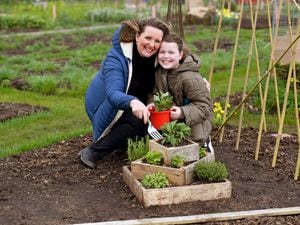Hidden away, the young who suffer in lockdown
Sandra McNair of the West Midlands branch of the NSPCC tells of the charity's concerns for the safety of some children during lockdown.

As lockdown continues, at the NSPCC we are becoming increasingly concerned about the safety of some children who may be hidden from sight during the coronavirus crisis.
Coronavirus is presenting us with a number of huge challenges, one of which is how we keep children safe when so much of everyday life is going on behind closed doors.
Children across the region and beyond are facing a myriad of problems ranging from the daily terror of domestic abuse, to neglect or parents with drug or alcohol dependency. Lockdown is intensifying these issues, and leaving these children seemingly with nowhere to turn.
It is crucial that all of us in society recognise we have a role to play in looking out for those young people for whom home may not always be the safest place.
Our Childline service has seen a huge increase in contacts from young people worried about coronavirus, or suffering abuse or neglect at home during lockdown.
But what can adults do to help ensure those children who don’t speak out – or who aren’t able to reach out – get the help they need?
Schools are closed, and social distancing measures are inevitably restricting the contact that many professionals have with families. So the opportunities for warning signs to be spotted have been severely reduced.
Therefore, we want people from all walks of life to know how and where to raise concerns about child safety and wellbeing.
The NSPCC has a free and confidential helpline for adults, where experts are available to offer advice and, if necessary, refer reports to local agencies such as police or social services.
To raise awareness of this important service during a time of great uncertainty, we have launched a new TV and advertising campaign across the UK.
The Government has provided £1.6m in funding so that the NSPCC can expand its helpline by employing more staff across two sites and raise public awareness of it.
The work comes as we publish the latest data from our helpline which shows that the crisis has exacerbated existing risks for children and created new ones.
In the month since lockdown there have been a total of 5,237 contacts to the helpline from across the UK from adults concerned about the wellbeing and safety of a child.
Of these, 817 contacts were from adults with worries about parents and carers misusing alcohol and other substances, a 22 per cent increase on the four weeks prior to March 23.
Other issues where there has been a double-digit percentage increase in contacts include domestic abuse at 10 per cent and emotional abuse at 50 per cent.

From April 13 to 19 the NSPCC helpline received 1,580 contacts, the highest number in a single week in 2020.
We all have a role to play in looking out for children during these unprecedented times, and there are a number of warning signs that may indicate something concerning is happening in a child’s life.
These can include aggressive or repeated shouting; hearing hitting or things being broken; children crying for long periods of time; very young children left alone or are outdoors by themselves; children looking dirty or not changing their clothes; or children being withdrawn or anxious.
One adult who contacted the helpline in the last month said: “I am concerned about the children who live next door. Just now I heard the mother screaming and shouting at the child and I heard her say ‘shut the **** up’ and there were threats of violence too. There is an ongoing situation where the mother invites adults to the family home and there is a lingering of cannabis in the air whilst the children are present.”
With schools currently closed to the majority of pupils – and figures suggesting that many vulnerable children are not attending school during lockdown, even though they would be allowed to – it is more important than ever that anyone speaks out if they are concerned.
The Secretary of State for Education, South Staffordshire MP Gavin Williamson, said the Government is “backing the NSPCC helpline to be the first port of a call for anyone concerned about a child’s welfare”.
Thanks to the funding from the Government the NSPCC will be able to reach many more families across the UK that need help in this difficult time.
The message is that our helpline is here to provide confidential support and advice to anyone with concerns about the safety and wellbeing of a child.





